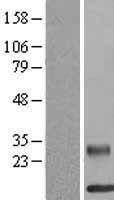order histories, retained contact details for faster checkout, review submissions, and special promotions.
Forgot password?
order histories, retained contact details for faster checkout, review submissions, and special promotions.
Locations
Orders Processing,
Shipping & Receiving,
Warehouse
2 Shaker Rd Suites
B001/B101
Shirley, MA 01464
Production Lab
Floor 6, Suite 620
20700 44th Avenue W
Lynnwood, WA 98036
Telephone Numbers
Tel: +1 (206) 374-1102
Fax: +1 (206) 577-4565
Contact Us
Additional Contact Details
order histories, retained contact details for faster checkout, review submissions, and special promotions.
Forgot password?
order histories, retained contact details for faster checkout, review submissions, and special promotions.
RETNLB / RELM-Beta
resistin like beta
FIZZ1 is the founding member of a gene family including two other murine genes expressed in intestinal crypt epithelium and white adipose tissue, and two related human genes. FIZZ1 mRNA and protein expression occur at low levels in a subset of bronchial epithelial cells and in non-neuronal cells adjacent to neurovascular bundles in the peribronchial stroma, and in the wall of the large and small bowel. During allergic pulmonary inflammation, mFIZZ1 expression markedly increases in hypertrophic, hyperplastic bronchial epithelium and appears in type II alveolar pneumocytes.
| Gene Name: | resistin like beta |
| Synonyms: | RETNLB, CCRG, Fizz1, HXCP2, Found in inflammatory zone 1, Resistin like beta, Resistin-like beta, RELM-beta, RELMb, RELMbeta, RETNL2, FIZZ2, Xcp2 |
| Target Sequences: | NM_032579 NP_115968.1 Q9BQ08 |







If you do not find the reagent or information you require, please contact Customer.Support@LSBio.com to inquire about additional products in development.









